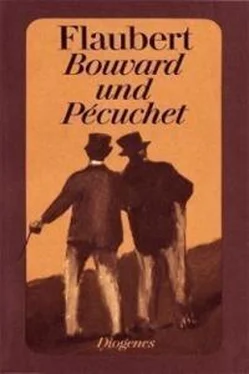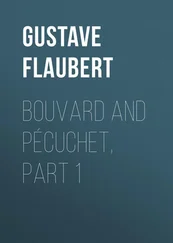Bouvard returned that she did not require anyone's consent. "What's to hinder you? Is it the trousseau? Our linen has the same mark, a B—we'll unite our capital letters!"
The idea caught her fancy. But a more important matter prevented her from arriving at a decision before the end of the month. And Bouvard groaned.
She had the politeness to accompany him to the gate, escorted by Marianne, who carried a lantern.
The two friends kept their love affairs hidden from each other.
Pécuchet counted on always cloaking his intrigue with the servant–maid. If Bouvard made any opposition to it, he could carry her off to other places, even though it were to Algeria, where living is not so dear. But he rarely indulged in such speculations, full as he was of his passion, without thinking of the consequences.
Bouvard conceived the idea of converting the museum into the bridal chamber, unless Pécuchet objected, in which case he might take up his residence at his wife's house.
One afternoon in the following week—it was in her garden; the buds were just opening, and between the clouds there were great blue spaces—she stopped to gather some violets, and said as she offered them to him:
"Salute Madame Bouvard!"
"What! Is it true?"
"Perfectly true."
He was about to clasp her in his arms. She kept him back. "What a man!" Then, growing serious, she warned him that she would shortly be asking him for a favour.
"'Tis granted."
They fixed the following Thursday for the formality of signing the marriage contract.
Nobody should know anything about it up to the last moment.
"Agreed."
And off he went, looking up towards the sky, nimble as a roebuck.
Pécuchet on the morning of the same day said in his own mind that he would die if he did not obtain the favours of his little maid, and he followed her into the cellar, hoping the darkness would give him courage.
She tried to go away several times, but he detained her in order to count the bottles, to choose laths, or to look into the bottoms of casks—and this occupied a considerable time.
She stood facing him under the light that penetrated through an air–hole, with her eyes cast down, and the corner of her mouth slightly raised.
"Do you love me?" said Pécuchet abruptly.
"Yes, I do love you."
"Well, then prove it to me."
And throwing his left arm around her, he embraced her with ardour.
"You're going to do me some harm."
"No, my little angel. Don't be afraid."
"If Monsieur Bouvard―"
"I'll tell him nothing. Make your mind easy."
There was a heap of faggots behind them. She sank upon them, and hid her face under one arm;—and another man would have understood that she was no novice.
Bouvard arrived soon for dinner.
The meal passed in silence, each of them being afraid of betraying himself, while Mélie attended them with her usual impassiveness.
Pécuchet turned away his eyes to avoid hers; and Bouvard, his gaze resting on the walls, pondered meanwhile on his projected improvements.
Eight days after he came back in a towering rage.
"The damned traitress!"
"Who, pray?"
"Madame Bordin."
And he related how he had been so infatuated as to offer to make her his wife, but all had come to an end a quarter of an hour since at Marescot's office. She wished to have for her marriage portion the Ecalles meadow, which he could not dispose of, having partly retained it, like the farm, with the money of another person.
"Exactly," said Pécuchet.
"I had had the folly to promise her any favour she asked—and this was what she was after! I attribute her obstinacy to this; for if she loved me she would have given way to me."
The widow, on the contrary, had attacked him in insulting language, and referred disparagingly to his physique, his big paunch.
"My paunch! Just imagine for a moment!"
Meanwhile Pécuchet had risen several times, and seemed to be in pain.
Bouvard asked him what was the matter, and thereupon Pécuchet, having first taken the precaution to shut the door, explained in a hesitating manner that he was affected with a certain disease.
"What! You?"
"I—myself."
"Oh, my poor fellow! And who is the cause of this?"
Pécuchet became redder than before, and said in a still lower tone:
"It can be only Mélie."
Bouvard remained stupefied.
The first thing to do was to send the young woman away.
She protested with an air of candour.
Pécuchet's case was, however, serious; but he was ashamed to consult a physician.
Bouvard thought of applying to Barberou.
They gave him particulars about the matter, in order that he might communicate with a doctor who would deal with the case by correspondence.
Barberou set to work with zeal, believing it was Bouvard's own case, and calling him an old dotard, even though he congratulated him about it.
"At my age!" said Pécuchet. "Is it not a melancholy thing? But why did she do this?"
"You pleased her."
"She ought to have given me warning."
"Does passion reason?" And Bouvard renewed his complaints about Madame Bordin.
Often had he surprised her before the Ecalles, in Marescot's company, having a gossip with Germaine. So many manoeuvres for a little bit of land!
"She is avaricious! That's the explanation."
So they ruminated over their disappointments by the fireside in the breakfast parlour, Pécuchet swallowing his medicines and Bouvard puffing at his pipe; and they began a discussion about women.
"Strange want!—or is it a want?" "They drive men to crime—to heroism as well as to brutishness." "Hell under a petticoat," "paradise in a kiss," "the turtle's warbling," "the serpent's windings," "the cat's claws," "the sea's treachery," "the moon's changeableness." They repeated all the commonplaces that have been uttered about the sex.
It was the desire for women that had suspended their friendship. A feeling of remorse took possession of them. "No more women. Is not that so? Let us live without them!" And they embraced each other tenderly.
There should be a reaction; and Bouvard, when Pécuchet was better, considered that a course of hydropathic treatment would be beneficial.
Germaine, who had come back since the other servant's departure, carried the bathing–tub each morning into the corridor.
The two worthies, naked as savages, poured over themselves big buckets of water; they then rushed back to their rooms. They were seen through the garden fence, and people were scandalised.
Chapter VIII.
New Diversions.
Satisfied with their regimen, they desired to improve their constitutions by gymnastics; and taking up the Manual of Amoros , they went through its atlas. All those young lads squatting, lying back, standing, bending their legs, lifting weights, riding on beams, climbing ladders, cutting capers on trapezes—such a display of strength and agility excited their envy.
However, they were saddened by the splendour of the gymnasium described in the preface; for they would never be able to get a vestibule for the equipages, a hippodrome for the races, a sweep of water for the swimming, or a "mountain of glory"—an artificial hillock over one hundred feet in height.
A wooden vaulting–horse with the stuffing would have been expensive: they abandoned the idea. The linden tree, thrown down in the garden, might have been used as a horizontal pole; and, when they were skilful enough to go over it from one end to the other, in order to have a vertical one, they set up a beam of counter–espaliers. Pécuchet clambered to the top; Bouvard slipped off, always fell back, finally gave it up.
The "orthosomatic sticks" pleased him better; that is to say, two broomsticks bound by two cords, the first of which passes under the armpits, and the second over the wrists; and for hours he would remain in this apparatus, with his chin raised, his chest extended, and his elbows close to his sides.
Читать дальше








![Гюстав Флобер - Закат Карфагена [Сборник]](/books/414440/gyustav-flober-zakat-karfagena-sbornik-thumb.webp)


